The Sky Crawlers
The Sky Crawlers (2008) is an art film disguised as war film. Considering Mamoru Oshii previous works such as Angel's Egg or Jin-Roh: The Wolf Brigade, this film is expected to artistic or not typical. Indeed, this film is quiet and philosophical although it does not fully translate to engaging or entertaining. The story itself is convoluted and characters uninteresting but not without merit or meaning. As a simple synopsis, a boy joins a military air force and discovers the truth about the war and himself. Seems like a normal coming of age.
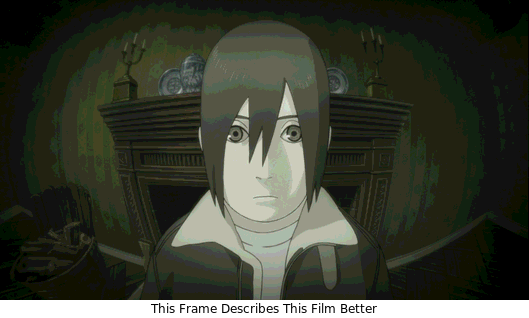
Rather than discussing the actual story, this article will tackle several points but not necessarily join them under a unified idea; rather, finding the branches show where the tree lies. Finally, take my words with a grain of salt as I am merely talking about the things that made me appreciate this film.
SPOILERS AHEAD
Coming of Age
Several titles have raised this theme of maturity such as FLCL or The Garden of Words, but it is raised here by the concept of kildren. To reiterate, kildren are genetically modified clones that live forever and stay in adolescence, the dream of being a teenager eternally. Strangely, they behave like any adult would: drink beer, engage in casual sex, smoke, kill, and bear children. What then is the difference between an adult and an eternal teenager? It certainly is not their physicality.
Rather, what is the point of this mechanic if it is conflicted? First, our protagonist says that they can be adults be chooses not; regardless of how, maturity is instead a choice or option that disregards why they are in eternal adolescence. Second, The Teacher is unbeatable or stronger by virtue of being a man or adult; regardless of why, nobody evidently matures to make a comparative comparison, before and after changes if you will. Third, the kildren make the excuse that death may come tomorrow thus why bother maturing; a skewed yet reasonable excuse. Fourth, they are meant or designed to be kids. All these points seem to be questioning this core mechanic, instead of supporting it. If it was setup to be questioned, it seems arbitrary, artificial or contrived.
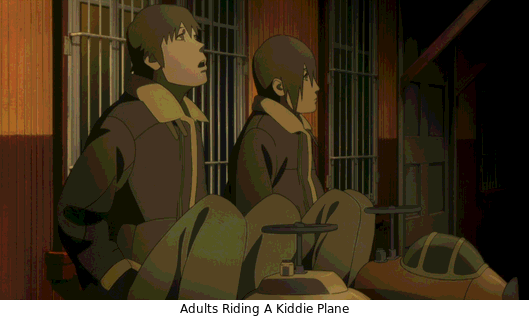
Most protagonist matures by the trials and tribulations in the story and the characters are clearly setup to be children. Indeed, the final fight is about succeeding the father as indicated by the line I'll kill my father. Similar to Big Boss from Metal Gear Solid 3: Snake Eater, killing The Teacher is implicitly inheriting the role of the strongest pilot, not necessarily unbeatable; symbolically, that person is an adult. Although shot down, the story is strangely similar to a coming of age. Whether The Teacher is a normal human or kildren, the teacher or sensei is the guide or parent the students or children must surpass, a fitting name in context.
However, this is only symbolic; defeating The Teacher does nothing as the system will perpetuate itself. Ultimately, the act does make anyone mature; rather, nobody changes or matures during the entire film. The dissonance between the abstract and real subverts the theme of coming of age. This subversion argues that maturity is not necessarily the answer, but something else entirely specially to their unending circumstance.
What is the answer? Perhaps, no answer exist as the film ends where it starts. If I were them, I would blow up the faceless and symbolic company creating kildren like Agent 47 from Hitman, but that itself is not the end. To conclude from a saying, a child is an adult who needs more time, even in the face of immortality.
Entertainment
If you take all the dogfight scenes and remove everything else, you could argue the result would be a more engaging film; however, in doing that it shows the preference to be entertained rather than learn. If the war is for entertainment, then the fights are meaningless; even if you consider the final scene to be meaningful, it is a futile fight.
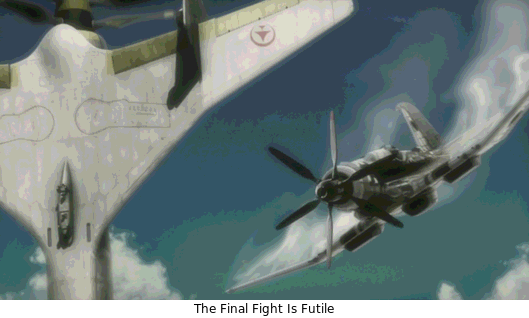
The film satisfies the minor and major fight requirements yet are hollow in context. Subtly, the fights are to serve both the internal audience and external viewer. The need to be distracted. In that way, the film does not need dogfights, but flashes of light and sound.
Hypothetically, you might change the film that shows cops and robbers instead of war; as consumers of TV, anime, movie or film media, should it be concerned with telling a story or entertaining us? In entertainment, we see and take from it yet it is fake or produced. With the act of re-imagining the conflict or action, it talks about the viewer, the reason and the purpose. For example, the action can be about wrestling with masked fighters, pro-gaming with character creations, supermarkets with market activity, or anything with a sided conflict. Although the aspect of direct death is removed, the interchangeability suggests that the action is superficial, both in the story and to the viewer. After all, the military base is called a theater.
If the film is boring, then it might have been meant that way but not without artistic effect or meaning. The effect is that the viewer experiences the superficiality and grind that our protagonist feel without being preachy or direct. Avoiding hypocrisy, should a film criticizing entertainment be entertaining?
Instead, what is important to the film if it itself is superficial? To look for meaning in the void? Strangely, the protagonist and the viewer are doing the same thing; the struggle of finding purpose in a meaningless world or film? If the search is not inside or within, is it outside or external? Is this film asking us to find value not within the film or art? The question of purpose is fascinatingly hidden yet absent in this superficial film.
Video Games
If the whole film was framed as an air plane simulator like the Ace Combat series, the mechanics and meaning will make more sense. A simple definition, a game is an exercise that has rules or mechanics and an objective. Being loose, here are some points that allude to the film as a video game:
- The Teacher as the final boss
- The pilot that can never be beaten. The player must earn enough experience to "kill the father".
- Kildren as player avatars
- If the kildren are clones, they come from a base of available players to select.
- Unlimited sorties as missions
- The entertainment war allows for uncountable missions before fighting the final boss.
- Death as a failure state
- If the kildren die, it is a game over and the player has to recreate or clone his player to try again.
These points might not define a true game but it is does allude to elements of online role-playing and action games. If the post-credit scene zoomed out to a screen, it would reinforce the message of war as meaningless entertainment because playing war is the game.
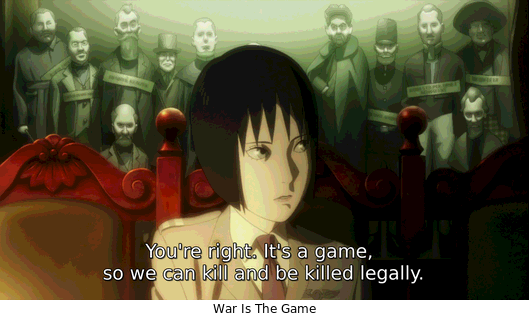
Even without that, the film can be thought of as a large scale action game. To be exact, a video game, not just a game. What ultimately leads me to this idea is the cyclic or restart mechanic. Each time our protagonist dies, the game or cycle repeats. Similarly, Groundhog Day, Edge of Tomorrow, Steins;Gate or Source Code can be thought of as games but the emphasis is greater on this film.
Before the final fight, the protagonist makes a comment that can be interpreted in the lens of video game disenchantment:
KANNAMI: You can change the side of the road
that you walk down every day.
Even if the road is the same,
you can still see new things.
Is that not enough in life?
Is it enough to keep playing a game differently? If the game has been played, what reason is there to play again? Fun? Completion? Tradition? Regardless, what reason is there to live even if the game cannot be beaten? This is hinted by the suicide of the protagonist's previous reincarnation. What is disheartening about this action is that death is rendered meaningless by reincarnation or respawn mechanic; the game must be played continuously and endlessly despite reason or purpose. For the player or protagonist, does this sound like insanity?
The game frame raises a fundamental question: who is the player? It may be the faceless and symbolic cloning company or the hapless kildren themselves, but an interesting answer is the curious viewer who will keep playing the video until boredom or meaning is achieved. Indeed, what do we look for in video games or films? Story? Action? Fun? Distraction? Meaning? Rather, if the film was meant to have no strong story or meaningful action, the film works as a subversion of substance both on the actual and meta level, game or not. In context, are games about flash and lights, and less about meaningful mechanics or values? To sketch the game analogy with the plot points in mind:
- Start a new game (Start of the film)
- Foreshadow the story (The Teacher as final boss)
- Choose an avatar (Introduction of main character)
- Play a few missions with interspersed story (Dog fights)
- Final boss unlocked (Death of kildren allies)
- Increase stats or level (Time-lapse after the realization)
- Challenge the dragon (Fighting The Teacher)
- Game over (Killed in combat)
- Restarting a new game plus with the same avatar (Cloning of kildren)
- Repeat until the game boss is beaten (End of film)
- Is the player expecting a reward on each replay?
This idea is not definitive but to say the film could be a framed or presented as a game is not a bad idea. Given the mechanics above, a video game taking from Fire Emblem, Dark Souls and Ace Combat can be made subverting the air plane simulator genre and playing in general. Although a video game exist that expands on the story of The Teacher, the idea is primarily a subversion as with Hotline Miami or more closely Spec Ops: The Line but backstory would be appreciated for the lack. To summarize, by imagining this film framed in a video game, it questions what the viewer or player expects of it.
Unexplored Points
Here are some other points that I couldn't fully explore because of time limitations:
The Diner Man And Old Man
Who is the old man outside Daniel's Diner? Strangely, when the diner waiter or server sat beside him, they look oddly similar.
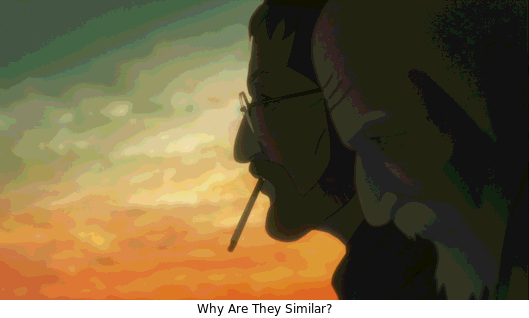
Even if they are not, what does he represent? Rather, he is the only old person in the film. Speculating, the old people are not taken care of. Nobody, not even the protagonist bothers to offer him a jacket or smoke. Perhaps, old people don't exist or are less than kildren who are pitied when they die. (Another old person exist within the same scene but not directed or focused by the screen.) Who he is and his significance, we may never know.
Counting
An early dissonance that kept me intrigued in the counting error when the white haired pilot says there is usually three of them but there are four of them if the previously killed pilot was included.
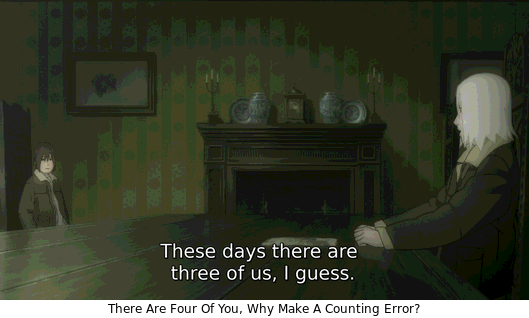
That is strange indeed. Even stranger when just before the final fight, there are six planes. With the respawn mechanic, we have the base three, the new female, the twins and our protagonist that makes seven in total.
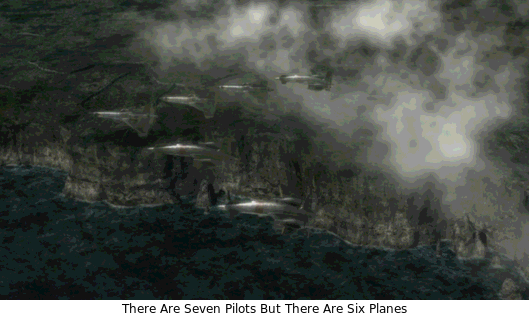
When the planes return, the little sister makes a point in counting the planes that return. Why count when the accounting is wrong? Another scene is when our protagonist tells the commander there are three bombers instead of two.
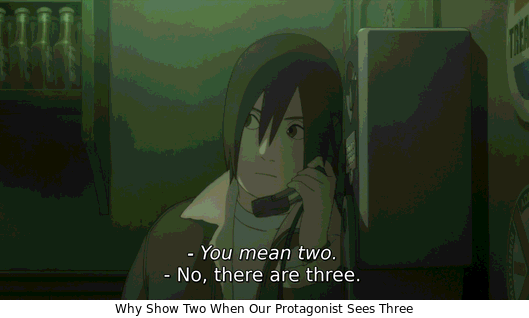
As viewers, we can clearly see two bombers but why is our protagonist saying three. Why is there an incongruity on counting? I could be counting wrong and reading into it too much, but this is given some screen time. The question is what does it mean that people can't count properly? Even stranger, the film doesn't even use this fact, as if it is a running gag or quirk. Several things come to mind but it might be a mystery that might drive me insane.
Empty City
Why is the new city empty? During their bowling session, they are girls playing but why is there no soul tapping the sidewalk?
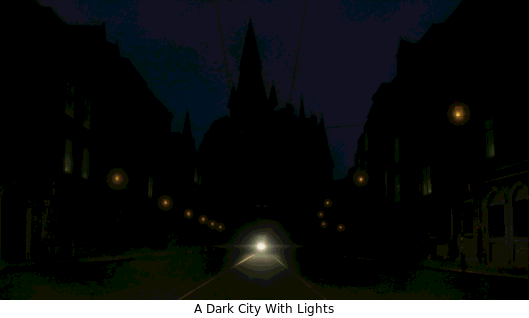
This could be a visual style, nothing truly symbolic or to read in to. Thankfully, I am not bothered as much, only slightly.
The Old Lady
The old lady (or more likely the whore) is somewhat a chronicler of the times as she knows who The Teacher, previous and current pilot are.

Her identity is not a big deal but I can only guess that she is the owner as indicated by her back tattoo. Just like with The Mother or chief mechanic, they're willingness to be normal human actors in the game is intriguing; wouldn't they want change as well? Nonetheless, not a big deal.
Aside, I think the animal in her back reminds me of a Leviathan from Final Fantasy VIII and the animal in her front is an owl but both are guesses and can find no substantial links or hints.
Albert Camus
During the first meeting with the commander, she mentions (Albert) Camus, an existential philosopher. In particular, The Myth of Sisyphus might be a better allegory or comparison to the film. I am not an expert in the source but a quick read alludes to several themes to the film itself such as meaning, suicide and futility.
Conclusion
To conclude, all these points don't necessarily redeem the film but makes it intriguing from an intellectual and meta level. I have probably spent too much time thinking or writing about it than but I do wish to explore what else this weird experience means. I don't know if the film has a unified idea but it could have one more than many. Mamoru Oshii really knows how to drive me insane.
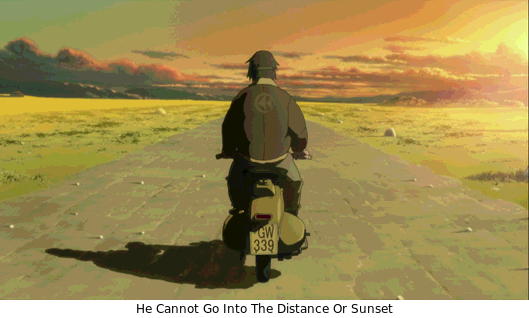
I can't recommend this to anyone, even for intellectuals, but I do hope my writing has eased the mental struggle for those who seen this as I have.